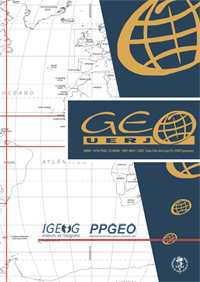SOCIAL HOUSING AND SUSTAINABLE URBAN DEVELOPMENT: THE CASE OF GOIANIA METROPOLITAN REGION
DOI:
https://doi.org/10.12957/geouerj.2017.28323Keywords:
Social habitation, Sustainable development, Urban ReconfigurationAbstract
doi: 10.12957/geouerj.2017.28323
This article aims to analyze the set of transformations that occurred in the urban space of Goiânia, from the construction of the "modern city", in 1933, to the constitution of its young metropolitan region at the end of the 1990s, according to the extraordinary population growth and the resulting "Urban unsustainability"; As evidenced in enormous environmental and social liabilities, especially in the problematic of housing of social interest: proliferation of urban possessions, peripheral subdivisions, intense process of "invasions", irregular occupations in green areas, voucher funds, permanent preservation areas (APPs) And in areas at risk, causing water resources to be compromised, environmental degradation and high housing deficit; With the predominance of the construction of popular housing projects in "segregated spaces", distant from the city center, with scarce infrastructure, lack of urban equipment, services and difficulty access to precarious urban transport (past and present). The georeferenced mapping of the new housing built by the popular programs PAC Housing, Credit Solidario and Minha Casa Minha Vida allowed to verify the pattern of the "new peripheralization" and "peripheralization of verticalization" in the RMG; denying a set of situations that denote "socio-environmental injustice" and contradict the ostentation of the titles of "Brazilian capital with better index of quality of life" (received from OMEMP in 2009) and "Sustainable City" (UBERLAC), with a view to , Above all the average green area of 94m2 / inhabitant (considered above the average recommended by the UN).
Downloads
Downloads
Published
How to Cite
Issue
Section
License
The copyright of articles published in Geo UERJ belongs to their respective authors with rights to first publication conceded to the journal. Every time that the article is cited and reproduced in institutional repositories or personal and professional web pages the link to the journal web page must be provided Geo UERJ.

The articles are simultaneously licensed under theCreative Commons Atribuição-Não Comercial-Compartilha Igual 4.0 Internacional.


